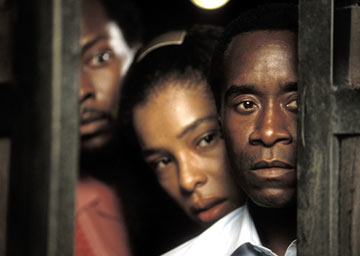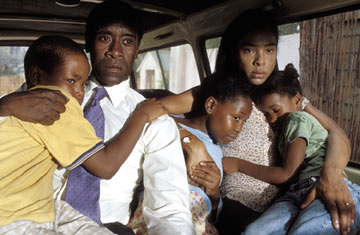

One of the great moral failures of the industrialized West in the last decade was its indifference towards the genocide in Rwanda in 1994. Over the course of a little over three months, nearly 1 million people were slaughtered as a result of ethnic tensions between the Tutsi minority, which held power, and the Hutu majority. The West did not learn their lesson, as tensions flared again between Hutus and Tutsis last summer in the Democratic Republic of the Congo, and a different genocide ran amok in the Darfur region of Sudan. The West again, for the most part, ignored the horrible acts of violence, especially in Sudan. Yet, amidst all of the brutality, there existed pockets of humanity. In World War II, there was Oskar Schindler in Germany and John Rabe in Nanjing. In 1994 Rwanda, there was Paul Rusesabagina (Don Cheadle, The Assassination of Richard Nixon, Ocean's Twelve), hotel manager of the Milles Collines.
As innocent civilians died violently around Kigali, Rusesabagina did what he did best - he ran the hotel. Now, his guests were not rich European tourists but Tutsi refugees. Rusesabagina was in a unique position. He was ethnically Hutu, and his wife Tatiana (a powerful Sophie Okonedo, Dirty Pretty Things, Once Seen) was Tutsi. When rumors of violence began, Rusesabagina reassured everybody that these were just rumors, and that things would be okay shortly. As a hotel manager, it was Rusesabagina's job to put out fires. He was the person everybody went to when they needed something, and Rusesabagina made sure that his guests always had everything they needed. This put him in another unique position - by currying favor with important people, he acquired a number of useful friends and contacts.
When the massacres began, Rusesabagina did what he knew best, served his guests with the utmost profession. He wanted to ensure that the Milles Collines was an "oasis" of tranquility amidst the chaos outside. People could come to him for safety, and because he had contacts in the military, he could ensure their safety. There, they patiently waited for international intervention, which, as most people know, never came. Director Terry George, who co-wrote the story with Keir Parson, presents a start portrait of a country at war. They do not hold back on the violent images, damning other countries for their inaction. The viewer sees everything through the eyes of Rusesabagina, and understands his changing emotions, as they move from patience to a sense of futility.
George portrays the West through two characters, UN Colonel Oliver (Nick Nolte, Hulk, Northfork) and cameraman Jack (Joaquin Phoenix, Ladder 49, The Village). Oliver wants to help, but cannot due to his orders to protect his soldiers. He cannot fire his weapons. Jack is a cameraman extremely disturbed by the massacres around him, but realizes that the international community will not care. And this breaks his heart. As conditions worsen, the international community does come to the aid of its citizens, evacuating them all out of the hotel, but leaves the Rwandans to fend for themselves. Rusesabagina now has a hotel overflowing with Rwandan refugees, and his efforts to protect them prove increasingly difficult.
This movie belongs to Cheadle, in his best role to date. This is saying a lot, as Cheadle has amassed an impressive resume, sometimes in lesser films. Still, he is long overdue for greater recognition, and if Hotel Rwanda does not provide this, there is something wrong with the world. As Rusesabagina, he knows that people are depending on him for their lives. Although he is falling apart on the inside, he strives to maintain an outward appearance of leadership and calmness. His desire to protect his family eventually conflicts with his desire to protect everybody, forcing him into very uncomfortable situations. It gets to the point where he can save his family at the expense of hundreds of other people. The inner turmoil is tremendous, and ably conveyed by Cheadle. Hotel Rwanda comes very close to becoming preachy and overdone, but George never crosses it. It's a great story, and also serves as a reminder on the consequences of inaction.